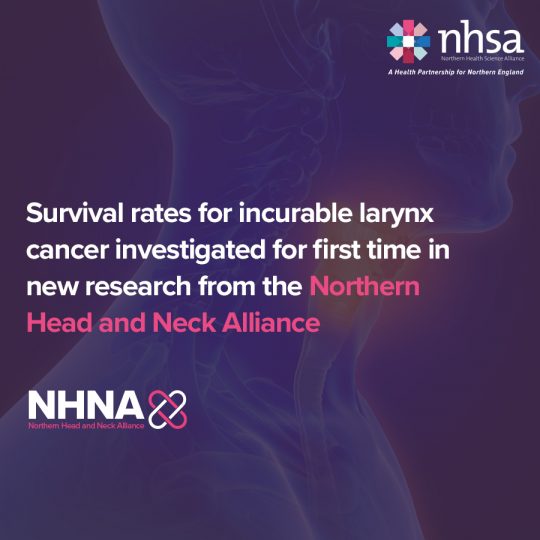
Survival rates for incurable larynx cancer investigated for first time
First-of-its-kind research looking at survival rates for patients with incurable larynx cancer has been published this week.
13th December 2024
First-of-its-kind research looking at survival rates for patients with incurable larynx cancer has been published this week.
The research, led by cancer doctors and scientists from the Northern Head and Neck Alliance (NHNA), is the only study to exclusively explore survival times in laryngeal cancer patients managed without radical treatment. It was funded by the National Institute for Health and Care Research (NIHR).
Larynx cancer is among the deadliest of head and neck cancers. In the UK, it affects 2,400 patients each year, disproportionately affecting those from socioeconomically disadvantaged backgrounds.
Approximately half of all larynx cancer patients are diagnosed at an advanced stage. Around 20% of these patients have incurable disease or are not strong enough for aggressive treatment and so receive palliative care from the outset.
Patients in this situation want to understand how long they have if they don’t receive treatment so they can get their affairs in order and make empowered decisions for their final stages of life.
Yet, until now, accurate survival data for laryngeal cancer patients receiving non-curative management has been lacking, leaving clinicians to rely on anecdotal evidence.
Cancer experts from the Northern Head and Neck Alliance conducted this study to bridge the gap in evidence and support informed decision-making conversations between clinicians and patients.
Researchers looked at six years’ worth of data – from January 2015 to December 2021 – from nearly 400 patients treated with palliative intent in five major head and neck specialist centres in the North of England and Scotland.
From this, they have worked out a range of larynx cancer survival times depending on the stage of the disease and how severe it is.
The research, which has been published in Clinical Otolaryngology, centred on data from 373 patients, of which the average age was 72 and 73% were male. It found that:
- 17% had early-stage cancer, and 83% had late-stage disease.
- The average survival time was 9.1 months.
- For those where the cancer had spread to another part of the body, it reduced to 6.9 months, while those without had 9.4 months.
- Early-stage patients had an average survival time of 13.3 months, compared to 8.2 months for advanced disease.
- Approximately 75% of laryngeal cancer patients managed non-curatively had died by 12 months.
The NHNA is a large group of head and neck cancer experts from across the North of England and Scotland. Supported by the Northern Health Science Alliance (NHSA), the coalition brings together nine head and neck cancer centres that are all committed to collaborative research efforts.
For this study, retrospective data were compiled for patients with laryngeal squamous cell cancer from five large tertiary head and neck centres: Leeds Teaching Hospitals NHS Trust; Newcastle Upon Tyne Hospitals NHS Foundation Trust; Sheffield Teaching Hospitals NHS Foundation Trust; South Tees Hospitals NHS Foundation Trust; and Greater Glasgow & Clyde Hospitals.
Mr Amar Rajgor, ENT Registrar at Newcastle Hospitals, and NIHR Doctoral Fellow in Otolaryngology (Specialising in AI and Head & Neck Cancer), said:
“Laryngeal cancer, alongside hypopharyngeal cancer, has some of the poorest survival outcomes among head and neck cancers. Around one in five laryngeal cancer patients undergo non-curative management, yet there is a striking lack of comprehensive data on the survival outcomes for these patients.
“Understandably, people in this situation want to know how long they have left but, historically, doctors haven’t had robust evidence to guide these discussions.
“The Northern Head and Neck Alliance recognised the need to address this and worked collaboratively to compile and investigate data across five of the cancer centres represented within the group.
“This study is the first to explore life expectancy for patients with incurable larynx cancer and was made possible by the collaboration of clinicians and scientists across the whole of the North of England and Scotland.
“The findings of this research can now be used to help doctors give evidence-based guidance to their patients and families, helping them understand survival timelines and empowering patients to make informed choices about their care.”
Hannah Davies, Chief Executive of the Northern Health Science Alliance, which convenes the NHNA, said:
“This is incredibly important research that has the potential to make a real difference to the support and care provided to patients with incurable laryngeal cancer. It is thanks to the collaborative efforts and commitment of the academic and clinical cancer experts that make up the Northern Head and Neck Alliance that this research happened.”
Read the full paper ‘How Long Do I Have?’ – Examining survival outcomes in laryngeal cancer patients managed with non-curative intent in Northern UK: Insights from the Northern Head & Neck Cancer Alliance Retrospective Study in the journal, Clinical Otolaryngology at: http://doi.org/10.1111/coa.14260
Related News Articles
Webinar recording: Shaping the Future of Healthcare
The Northern Health Science Alliance, together with Innovate UK, held a webinar 'Shaping the future of healthcare: How to unlock the funding opportunities and academic expertise that can help drive your business forward'.
Read the articleNHSA Chief Executive responds to Spring Statement
The Northern Health Science Alliance's response to the Spring Budget announcement
Read the article#NorthInnovationWomen 2025 list revealed
We are shining the spotlight on hundreds of innovative women today - on International Women’s Day - as we publish the annual #NorthInnovationWomen list
Read the article